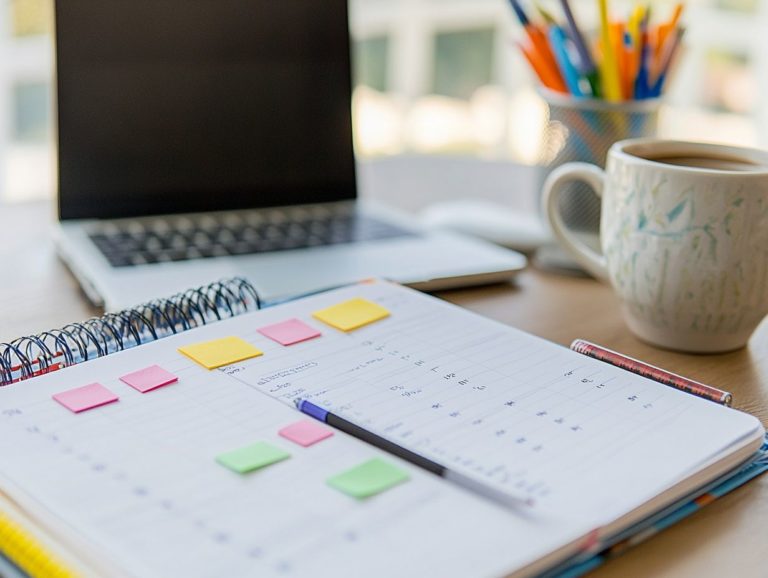what are the most common test preparation questions?
Preparing for tests can feel overwhelming, particularly when you encounter various question formats. This guide is designed to help you navigate the intricate landscape of test preparation questions, shedding light on their purpose and the different types, ranging from multiple choice to essay formats.
You will uncover effective strategies for tackling these questions, alongside valuable tips for efficient preparation and insights into common pitfalls to steer clear of.
With the right approach, you will boost your confidence and performance significantly, ensuring a smoother test-taking experience.
Contents
Key Takeaways:

- Effective strategies are key to answering test preparation questions successfully.
- Common formats include multiple choice, true/false, short answer, and essay questions.
- Proper preparation is crucial for avoiding mistakes when answering questions.
Understanding the Purpose and Types of Test Preparation Questions
Understanding the purpose and types of test preparation questions is essential for you as a pharmacy technician gearing up for the Pharmacy Technician Certification Board (PTCB) exam. These questions are crafted to evaluate your knowledge across a spectrum of areas, including pharmacy calculations, drug interactions, federal legislation, and patient safety.
By familiarizing yourself with common question formats and their underlying principles, you can bridge any knowledge gaps and enhance your exam performance. Recognizing the importance of active ingredients, brand names, and generic drugs is crucial for quality assurance and medication safety, ensuring you are fully prepared for your clinical responsibilities.
Among the various formats, multiple-choice questions challenge you to pinpoint the correct answer from a set of options. This simulates the decision-making you will encounter in a real pharmacy setting. These questions present scenarios related to drug dispensing or patient counseling, allowing you to hone the critical thinking skills essential for your daily duties.
Short answer questions invite you to articulate your understanding of fundamental concepts like dosage calculations and contraindications. This fosters a deeper comprehension of the material necessary for successful pharmacy practice.
Both formats not only prepare you for the exam but also enhance your ability to perform effectively and safely in a pharmacy environment.
Tips for Answering Test Preparation Questions
Successfully tackling test preparation questions hinges on effective strategies designed to reduce anxiety and elevate your overall performance. Embrace learning techniques that leverage your strengths while addressing any weaknesses. Additionally, it’s important to know what resources are available for test preparation, ensuring you fully grasp the content and format of standardized tests.
Implement study strategies, such as taking practice tests, to bolster your confidence and readiness for the PTCB exam.
First, crafting a structured study schedule helps you manage your time more efficiently, alleviating feelings of being overwhelmed. For example, breaking down complex pharmacy topics into smaller, manageable sections allows you to approach each part methodically.
Engage in learning by doing, like quizzing yourself or teaching others, to reinforce your knowledge retention.
Incorporate relaxation techniques, such as mindfulness or deep breathing exercises, before studying or taking a test to help keep anxiety at bay. By understanding your personal strengths, such as excelling in calculations, you can focus on targeted practice in weaker areas, resulting in a more balanced and confident test performance.
Start your preparation today! Take the first step to ace your PTCB exam!
Effective Strategies and Techniques
Effective strategies and techniques for exam preparation can profoundly impact your performance on the PTCB exam. By creating a structured study schedule and utilizing practice questions, you can bridge those knowledge gaps with confidence.
Engaging in active recall the practice of remembering information actively and spaced repetition will further solidify your understanding and retention of critical pharmacy concepts.
Discovering the study style that works best for you can be a game changer! For instance, if you re a visual learner, using imagery can enhance your retention. On the other hand, auditory resources may work wonders if you absorb information better through listening.
Incorporating quizzes and flashcards into your study material can significantly boost your recall, making you more familiar with essential terminology like drug classifications and dosage calculations.
Adding simulated exams to your study routine helps you pinpoint your strengths and weaknesses, allowing for targeted revisions that will ultimately elevate your confidence and performance when exam day arrives.
Common Types of Test Preparation Questions
You will encounter a variety of test preparation questions in the PTCB exam, including multiple choice, true or false, short answer, and essay questions.
Each of these formats is designed to evaluate your comprehensive understanding of essential pharmacy knowledge. Multiple choice questions typically test your recall and comprehension skills, while true or false questions challenge your binary thinking.
Short answer and essay questions require you to synthesize information, showcasing your ability to apply concepts in real-world scenarios. Embrace each format as an opportunity to demonstrate your expertise and readiness for the role of a pharmacy technician.
Multiple Choice Questions

Multiple choice questions dominate the PTCB exam, designed to evaluate your pharmacy knowledge and clinical function through a series of carefully crafted statements and options. These questions delve into a range of topics, such as drug interactions, pharmacy calculations, and patient safety areas that are crucial for your role as a pharmacy technician.
Grasping how these questions are structured and mastering the art of eliminating incorrect answers can significantly elevate your chances of success.
To tackle multiple choice questions effectively, begin by reading each question and all available options thoroughly before making a selection. It may serve you well to underline key terms and phrases to sharpen your focus on what’s being asked. For example, if a question inquires about the proper dosage of a specific medication, recall both standard dosages and relevant guidelines to inform your answer.
Employing critical thinking skills is essential; don t just fall back on memorization evaluate how your knowledge applies to real-world scenarios. Practicing sample questions can enhance your familiarity with common formats and bolster your confidence for the exam.
True or False Questions
True or false questions might seem straightforward, but their binary nature can pose a real challenge. These questions are designed to assess your grasp of critical concepts like federal legislation and medication safety, requiring you to sift through factual statements and misconceptions.
Your ability to accurately evaluate these assertions is vital for maintaining high standards of patient care as a pharmacy technician.
To effectively navigate these questions, it’s essential to pinpoint key terms that might hint at the correctness of a statement. For example, words like “always” or “never” often signify absolutes, which can lead to false statements since exceptions frequently arise in pharmacy practice.
On the other hand, phrases like “under certain conditions” or “in accordance with regulations” suggest that a statement may hold validity but needs context for confirmation.
Imagine encountering a question that states, “All medications must be stored at room temperature.” Recognizing that some drugs require refrigeration can significantly inform your judgment.
By honing in on these indicators, you can make educated guesses, even when uncertainty looms.
Short Answer Questions
Short answer questions require concise responses that show your understanding of pharmacy concepts, including calculations and active ingredients. These questions encourage reflection and the application of your knowledge, showcasing your grasp of essential information necessary for safe practice. Properly structuring your answers demonstrates clarity and depth of understanding.
Clarity and precision are crucial when calculating dosages and determining the active ingredients required for patient care. For example, if you’re asked to calculate the correct dosage of a medication based on a patient’s weight, a clear breakdown of your calculation steps is essential. Misinterpretations or vague responses can lead to critical errors in medication dispensing.
When discussing the active ingredients of a drug, being precise about their concentrations and effects ensures that patients receive accurate information. This level of detail reflects your knowledge and enhances safety and reliability within the pharmaceutical environment.
Essay Questions
Essay questions in the PTCB exam challenge you to express your understanding of complex pharmacy topics, such as patient safety and quality assurance, in a structured manner. These questions require thorough knowledge and critical thinking, asking you to present coherent arguments backed by relevant pharmacy information.
Your ability to combine information and convey it effectively in writing is vital as a pharmacy technician. To excel in crafting impactful essay responses, start by outlining your main points. Ensure that each argument flows logically.
For instance, when discussing medication errors, highlight potential causes, consequences, and preventive measures. Supporting details, such as statistics, case studies, or references to regulatory guidelines, will lend credibility to your assertions.
An effective conclusion summarizes your key arguments and emphasizes their significance in promoting patient welfare. Exploring topics like pharmacology or drug interactions can further enrich your analysis, showcasing a well-rounded understanding of the pharmacy field.
How to Prepare for Test Preparation Questions
Get excited about preparing for your pharmacy technician exam! By leveraging a range of test preparation resources, including practice tests and study guides, you can identify your knowledge gaps and deepen your understanding of key pharmacy concepts.
Implementing effective summer preparation strategies boosts your performance and enhances your confidence come exam day.
Study Techniques and Resources

Utilizing effective study techniques and resources can significantly enhance your exam preparation journey as a pharmacy technician. Tools like practice tests and educational materials are invaluable for identifying knowledge gaps and reinforcing your understanding of essential pharmacy concepts.
By leveraging these resources, you can improve your performance and readiness for the PTCB exam. One highly regarded technique is spaced repetition, which helps commit information to long-term memory by revisiting topics at timed intervals.
Engaging in active learning methods can also be beneficial. Teach concepts or apply them in real-world scenarios to deepen your grasp of the material.
Online platforms like Khan Academy and specialized pharmacy-focused study groups offer tailored content to meet your needs, while textbooks like “Comprehensive Pharmacy Review” serve as crucial references.
By combining these resources and techniques, you can create a robust study plan that boosts your comprehension and retention, ultimately leading to successful exam outcomes.
Mistakes to Avoid When Answering Test Preparation Questions
Avoiding common pitfalls can greatly influence your performance on the PTCB exam. Recognizing prevalent mistakes, like misreading questions or giving in to test anxiety, is essential for improving your academic abilities.
Be mindful of potential prescription errors stemming from a lack of attention. This underscores the necessity of careful examination and diligent preparation.
Common Pitfalls and How to Avoid Them
Pitfalls in test preparation can seriously affect your success as a pharmacy technician. You must learn to manage test anxiety and adopt effective study strategies.
For example, you might forget important medication safety principles or cram at the last minute. A structured study plan can help you avoid these issues.
Many aspiring technicians underestimate the importance of medication math. It’s essential to understand how this math affects patient safety.
Your study approach should include both theory and practice. Solve practice problems and use simulations to reinforce your skills.
Group study sessions can create a supportive atmosphere. They help ease anxiety and improve understanding of complex topics.
Use flashcards for key medication profiles and test-taking strategies. These tools can significantly boost your confidence!
Spotting these common challenges early can lead to better preparedness. Implement evidence-based strategies to improve your exam performance.
Frequently Asked Questions
What are the most common test preparation questions?
Common questions focus on understanding the test format and types of questions, as well as what test preparation is and why it is important, including the best strategies for studying and answering questions.
What strategies should I use for test preparation?

Create a study schedule and review key concepts. Practice with sample questions or past tests, and use memory aids like mnemonic devices.
How can I determine what material to focus on?
Identify the most important material by reviewing the test outline or syllabus. Consult your instructor or classmates for guidance.
Should I study alone or with a group?
This depends on what works best for you. Some prefer solo study for focus, while others thrive in group sessions where they can discuss material.
What are effective ways to manage test anxiety?
Practice relaxation techniques and break up your study time into smaller chunks. Ensure you get enough sleep and use positive visualization techniques.
How can I improve my test-taking skills?
Read directions carefully and manage your time wisely during the test. Double-check your answers and use tips from your instructor.






